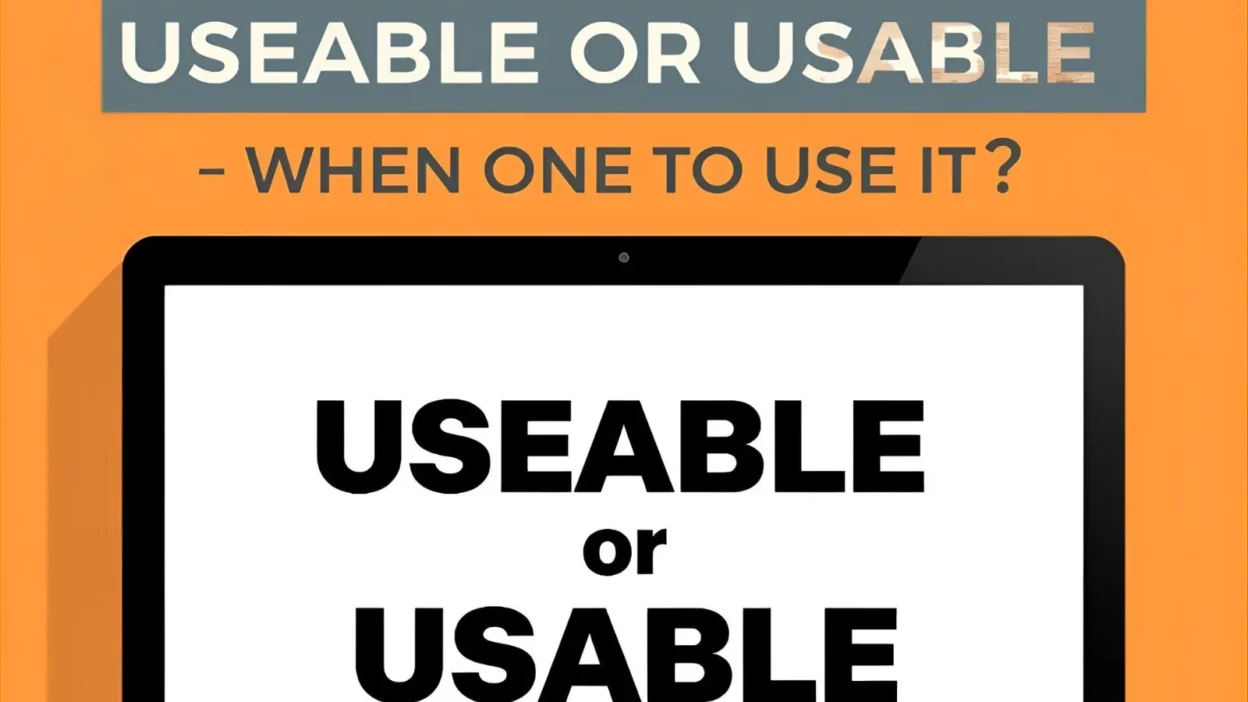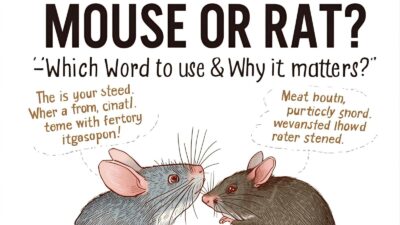If you’ve ever typed “useable or usable” and paused to wonder which spelling is correct—you’re not alone.
This is one of those small but surprisingly confusing English spelling questions that writers, students, and professionals face every day.
Whether you’re preparing a report, updating your website, or writing an email, choosing the right form matters for clarity and credibility.
The confusion comes from the subtle differences between British and American English.
Both words look correct, but one is preferred globally, while the other is becoming less common.
This article clears up that confusion once and for all.
You’ll learn the quick answer, the origin of both spellings, how British and American rules differ, and which one to use depending on your audience.
Let’s make your writing not just correct—but confident and professional.
Useable or Usable – Quick Answer
✅ The correct and most widely accepted spelling is “usable.”
“Usable” means able to be used or fit for use.
Example:
- The new laptop is usable even after the update.
- Is this old file still usable for the report?
“Useable” is also correct, but it’s less common and mostly seen in British English or older texts.
In short:
Usable = modern, preferred, and standard.
Useable = rare, acceptable, but outdated.
The Origin of “Useable” or “Usable”
Both forms come from the root verb “use” + the suffix “-able.”
Historically, “useable” appeared first in English texts during the 17th century, reflecting the rule of simply adding “-able” to verbs. Later, as English spelling became standardized (especially with dictionaries like Webster’s in America), “usable” became the simplified form.
Why the change?
American English tends to remove unnecessary letters for clarity and consistency. So “useable” lost its extra “e,” following the same logic as likable (not likeable) and movable (not moveable).
British English vs American English Spelling
| Aspect | British English | American English |
| Common spelling | Useable | Usable |
| Frequency in modern usage | Rare | Standard |
| Seen in official documents | Sometimes | Always |
| Example | The tool is useable for repairs. | The software is usable on all devices. |
British writers sometimes keep “useable” to preserve the word’s visual link to “use.”
However, even in the UK, “usable” is now more common in formal and digital writing.
Usable vs Useable
Both usable and useable are sometimes seen, but usable is the preferred and standard spelling in modern English. ✅
Usable ✅
- This is the most widely accepted spelling.
- Meaning: capable of being used, practical, or functional.
Examples:
- The app is very usable on smartphones.
- Only usable tools should be kept in the toolbox.
Useable ⚠️
- Technically understandable, but less common.
- Often considered nonstandard in formal writing.
Quick Tip
👉 Stick with usable for professional, academic, and standard English writing.
Usable or Useable: Which Is Correct?
Both usable and useable are technically understood, but usable (with one “e”) is the preferred and standard spelling in modern English. ✅
✅ Usable
- Most dictionaries list usable as the standard spelling.
- It means: capable of being used, practical, or functional.
Examples:
- This software is usable on all devices.
- The old furniture is still usable.
⚠️ Useable
- Some style guides accept useable, but it is less common.
- Avoid in formal writing to stay consistent with standard usage.
✔️ Quick Tip
👉 For professional and standard writing, always use usable, not useable.
Which Spelling Should You Use?
- If your audience is American: Always use usable.
- If your audience is British or from the Commonwealth (UK, Australia, Canada): Both forms are correct, but usable is still preferred.
- If your audience is global (online, business, or tech): Use usable—it’s recognized and accepted everywhere.
✅ Professional Tip:
Most modern dictionaries, including Oxford and Merriam-Webster, list usable as the main form, with useable as a variant.
Common Mistakes with “Useable” or “Usable”
- ❌ Writing “useable” in U.S. business documents (looks outdated).
✅ Correct: “The device is usable in all environments.” - ❌ Mixing both spellings in the same text.
✅ Choose one and stay consistent throughout. - ❌ Assuming one is wrong.
✅ Both are correct—but one is preferred for modern usage. - ❌ Overusing “usable” when “useful” fits better.
✅ “Usable” = fit for use.
✅ “Useful” = valuable or helpful.
“Useable” or “Usable” in Everyday Examples
- Email: “The attached file is usable for the next update.”
- News: “The old road became usable again after repairs.”
- Social media: “Finally got a usable Wi-Fi signal!”
- Formal writing: “All documents must be in a usable digital format.”
In everyday English, usable feels more natural and modern.
You’ll rarely see useable outside historical writing or British publications.
Useable or Usable in UK English?
In UK English, the preferred and standard spelling is also usable. ✅
Usable ✅
- Widely accepted in dictionaries (Oxford, Cambridge, Collins).
- Meaning: capable of being used, functional, practical.
Examples (UK English):
- This software is usable on all devices.
- Only usable equipment should be kept in the lab.
Useable ⚠️
- Technically understandable, but less common and not recommended in formal UK writing.
- Often seen as a variant spelling, but dictionaries favor usable.
Quick Tip
👉 In both UK and US English, always use usable, not useable, for correct and standard usage.
Usable or Useable in UK English?
The correct and standard spelling in UK English is usable. ✅
✅ Usable
- Preferred by UK dictionaries like Oxford, Cambridge, and Collins.
- Meaning: capable of being used, practical, or functional.
Examples:
- The software is fully usable on all computers.
- Only usable tools should be kept in the workshop.
❌ Useable
- Technically understandable, but less common.
- Not recommended in formal UK writing.
Quick Tip
👉 Always use usable in UK English for standard, professional, and academic writing.
Is It Usable or Useable?
The correct and standard spelling is usable with one “e.” ✅
✅ Usable
- Preferred in both UK and US English.
- Meaning: capable of being used, practical, or functional.
Examples:
- The app is very usable on all devices.
- Only usable tools should be kept in the workshop.
❌ Useable
- Technically understandable, but less common.
- Avoid in formal writing, as usable is the standard form.
Quick Tip:
👉 Always write usable, not useable, for correct English.
Is It Useable or Usable?
The correct and standard spelling is usable with one “e.” ✅
✅ Usable
- Preferred in both UK and US English.
- Meaning: capable of being used, practical, or functional.
Examples:
- This software is fully usable on all devices.
- Only usable materials should be kept in the workshop.
❌ Useable
- Technically understandable, but less common.
- Avoid in formal or professional writing.
Rule of Thumb:
👉 Always use usable, not useable, for correct and standard English.
“Useable” or “Usable” – Google Trends & Usage Data
According to Google Trends and corpus data:
| Spelling | Popularity (%) | Most Common In |
| Usable | 95% | United States, Canada, Global English |
| Useable | 5% | United Kingdom, Australia (minor usage) |
Search data shows that “usable” dominates worldwide searches and online publications. Even British dictionaries and educational sites now favor “usable” for clarity and global understanding.
FAQs
1. Is “useable” a real word?
Yes, but it’s old-fashioned and rarely used today. “Usable” is preferred.
2. Is “usable” grammatically correct?
Absolutely. It’s the modern, standard spelling accepted in both UK and US English.
3. Why do both spellings exist?
Because British English traditionally keeps extra vowels that American English simplifies.
4. Does “usable” mean the same as “useful”?
Not exactly. “Usable” means fit for use, while “useful” means helpful or beneficial.
5. Which spelling does Google favor?
“Usable” ranks far higher in SEO and content usage.
6. Should I use “useable” in academic writing?
No, most academic style guides (APA, MLA, Chicago) prefer “usable.”
7. Is “useable” ever wrong?
No, but it’s considered outdated and less professional in modern contexts.
Conclusion
When it comes to “useable” or “usable,” the difference is simple but important.
Both are correct, but “usable” is the modern, standard, and globally preferred spelling. It’s accepted by all major dictionaries, professional writing guides, and SEO tools.
If you’re writing for an American or international audience, always choose “usable.”
If you’re in the UK, you can technically use either—but “usable” still makes your writing look clean and consistent.
In today’s global world of emails, digital content, and business communication, clarity matters. So go with “usable”—the spelling that’s both practical and professional.
Discover More Articles:
- Chris’ or Chris’s Which Is Correct and When to Use Each? 2026
- “Mouse or Rat” Which Word to Use & Why It Matters? 2026
- Omelet or Omelette What’s the Right Spelling to Use? 2026
- “Past Due or Passed Due” What’s the Right Term? 2026



